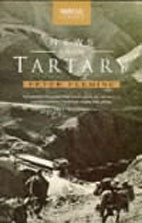News from Tartary - Peter Fleming

In the summer of '96, I was travelling round China on what was left of my student loan. In an effort to get away from the well-worn backpacker trail and the grey communist-bloc architecture of the Chinese cities, I took a spur-of-the-moment decision to visit Kashgar in the far west; from Xi'an, already in the west of "classic" China, the round trip was a 4000-mile journey. It took me two weeks. After the first leg, fifty-seven hours of gruelling sleeplessness in a crowded hard-seat train carriage, I thought I'd pretty much earned my stripes as a hardcore traveller - until I read Peter Fleming's account of the same journey in 1936, which puts my meagre achievements to shame.
In the mid-30s, China was seething with civil wars and occupations. Japan had the northeast, the Communists were active in the southwest, Russia had its eye on the far west, and Chiang Kai-Shek's Kuomintang had its provisional capital set up in Nanjing. News from the troubled western provinces was practically unobtainable, and with this in mind, Times Special Correspondant Peter Fleming set out westwards, aiming to get across to India and pick up as much news as he could en route - and at the same time get a really cool journey out of it. He was joined by Swiss journalist Ella ("Kini") Maillart, who had similar aims in mind, and they set off with the vain hope of being able to negotiate their way through rebel armies, deserts and countless checkpoints to gain access to that forbidden region.
Beyond the pass we were in the Tsaidam basin. The mountains became, and for the next five weeks remained, a backcloth only. We left on our right the tents and mud walls of a small settlement called Karakhoto and went forward into desolate dunes. Round Karakhoto there was a crude irrigation system, and the crossing of one channel gave us trouble. The camels floundered gawkily, imperilling the loads; on the faces of the Chinese amusement alternated with acute anxiety, and it was easy to tell whose goods were carried by which beasts.
As travel writing goes, this is some of the best. Fleming's style is beautifully descriptive but also doesn't take himself too seriously, and the anecdotes about the state of the expedition and his various travelling companions are just as interesting as the descriptions of hazardous mountain passes and bleak marshland. He makes a point of not over-dramatizing the journey - for example, the constant rumours of bandits are treated with good-natured contempt, rather than emphasised for the sake of an exciting story - but the realities of life on the road are very convincingly evoked, with a good eye for detail and a dry sense of humour. It's very much a tale of the journey, not the destination.
If there is a flaw, it's probably the result of the trip's "official" purpose - the News. Obviously mindful of his employers' requirements, Fleming does occasionally interject speculation about the chaotic international politics of the region, which is much less interesting now than it must have been at the time. There is a particularly dull passage in the middle where he leaves off the travel narrative to ascribe all sorts of nefarious motives to the Moscow government, and to propose some rather far-fetched conspiracy theories. Thankfully, though, this is quite short, and for the most part doesn't interfere with the travel tales; I've now read this book so many times I can safely skip through the boring bits.
It's hard to imagine now a world where it would take seven months to get anywhere, much less a journey crossing only one country. Most of what Fleming describes has now vanished forever - the nomadic caravans on the Qinghai plateau, the exiled communities of White Russians, the remote and stiff-upper-lipped outposts of the British Empire - and it's strange to think that this was just seventy years ago. Cheap flights, Lonely Planets and the "global village" are all very nice, but you can't help feeling envious of a time when travel was like this, a real adventure.
9/10



0 Comments:
Post a Comment
<< Home